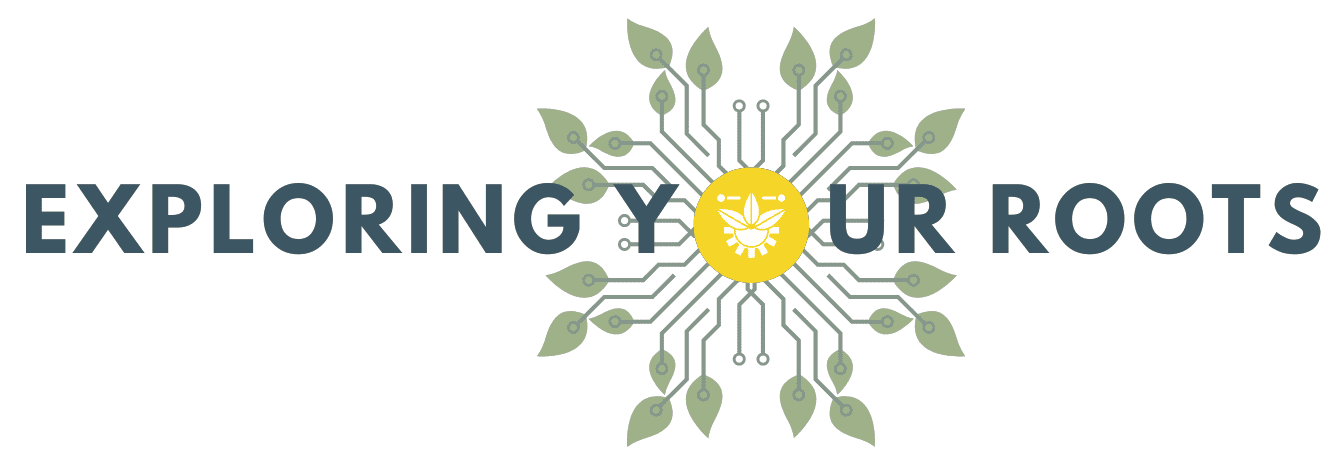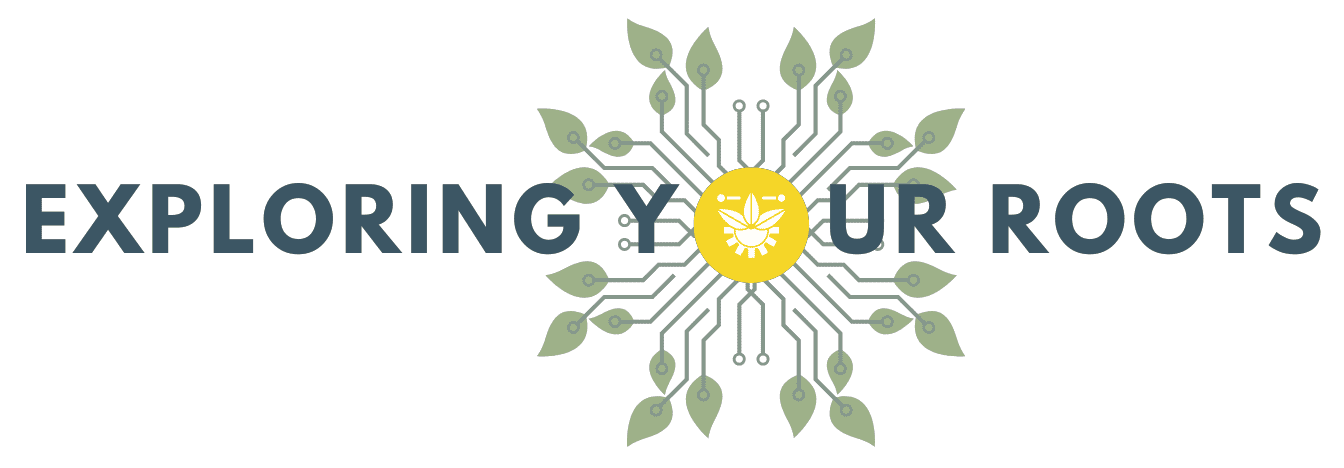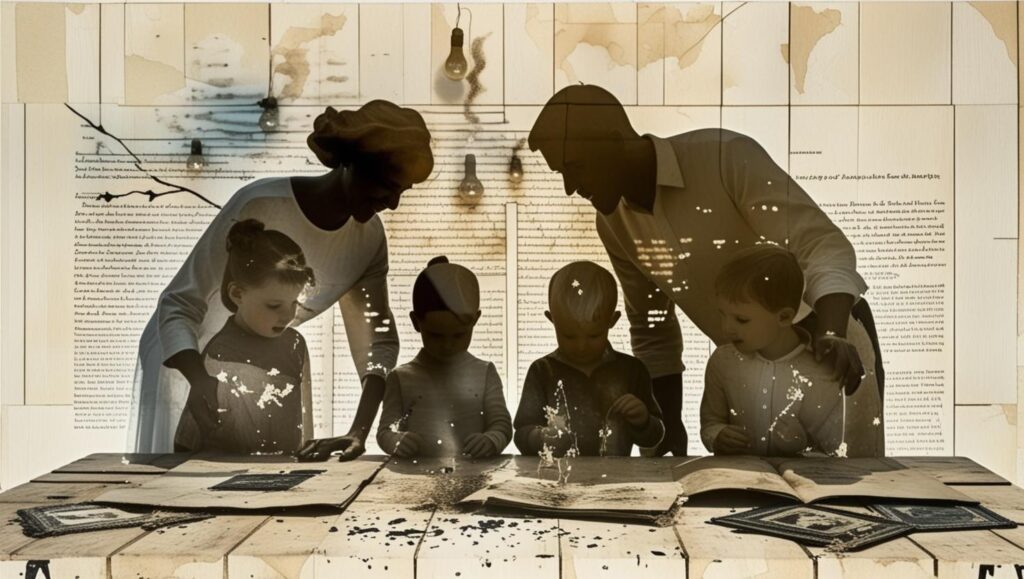A few years ago, I discovered old photos I had never seen on a blog about a branch of my mother’s family tree. As I scrolled through the images, each photo filled in details that had been missing from the family history that was passed down to me. I quickly realized those images weren’t just pictures of people I was somehow related to – they were pieces of my identity puzzle.
“What you are was prepared for generations,” wrote Carl Jung, capturing the profound truth about our connection to our ancestors. Our family trees are far more than just decorative charts or genealogical records – they are living maps that shape our emotional inheritance, identity, and behavior in ways we’re only beginning to understand.
While many of us look to our roots simply for names and dates, our family histories quietly mold us in remarkable and often invisible ways. Let’s explore five surprising ways your family tree influences who you are today.
1. Generational Trauma: The Science Behind Emotional Inheritance
If you’ve ever experienced anxieties or fears you can’t explain, your ancestors’ experiences may hold the key to what you’re feeling. Recent breakthroughs in epigenetics have revealed that trauma isn’t just psychological – it can be inherited biologically. In his book “It Didn’t Start with You,” author Mark Wolynn explains how traumatic experiences can modify gene expression, passing down to future generations.
A groundbreaking study of Holocaust survivors’ descendants demonstrated heightened stress responses and altered cortisol levels, suggesting trauma’s biological echo through generations. These findings help explain why some people experience inexplicable anxieties or fears that may have roots in their ancestors’ experiences.
Modern research continues to uncover how historical family trauma manifests in contemporary mental health challenges. Understanding this connection can help us approach our own emotional patterns with greater self-compassion and awareness. Healing these inherited wounds takes awareness and often professional help. Consider therapy or mindfulness practices if you notice recurring patterns of anxiety or stress.
2. Family Values Shape Worldviews
Our worldviews and core values often stem from family values and traditions passed down through generations. Philosopher Alasdair MacIntyre suggests these traditions serve as narrative frameworks through which we interpret the world. And those values and traditions whisper in your ear during major life choices.
Viktor Frankl’s work shows how our search for meaning often connects to family legacy. That drive you feel to pursue higher education? It might stem from the way learning has been valued throughout generations of your family lineage.
How families preserve and pass on cultural practices and beliefs do more than connect loved ones to their heritage – they shape their children’s understanding of identity, community, and belonging. Even in our digital age, families have learned to adapt traditional practices to modern contexts. Virtual family gatherings and digitally documented celebrations show how traditions evolve while maintaining their essential role in shaping family values.
Create your own values inventory. List what matters most to you. Then explore how these align with your family’s traditional values.
3. Career and Purpose: The Legacy of Occupational Heritage and Personality Traits
Your career path might be influenced in subtle but powerful ways by a family legacy. Multi-generational families of teachers, doctors, or craftspeople demonstrate how professional legacies shape career aspirations and life purposes. These patterns reflect deeper family narratives about success, fulfillment, and meaningful work.
This inheritance carries both pride and pressure. Children of entrepreneurs often feel drawn to business ownership, while artistic families might nurture creative pursuits across generations. Understanding this can help you embrace your family’s professional legacy or consciously carve your own path.
Scientists have also identified genetic components to personality traits like creativity and risk-taking. But the environment you grow up and live in plays a huge role too.
Understanding these patterns can help you make conscious choices. You can embrace positive traditions or mindfully break challenging cycles.
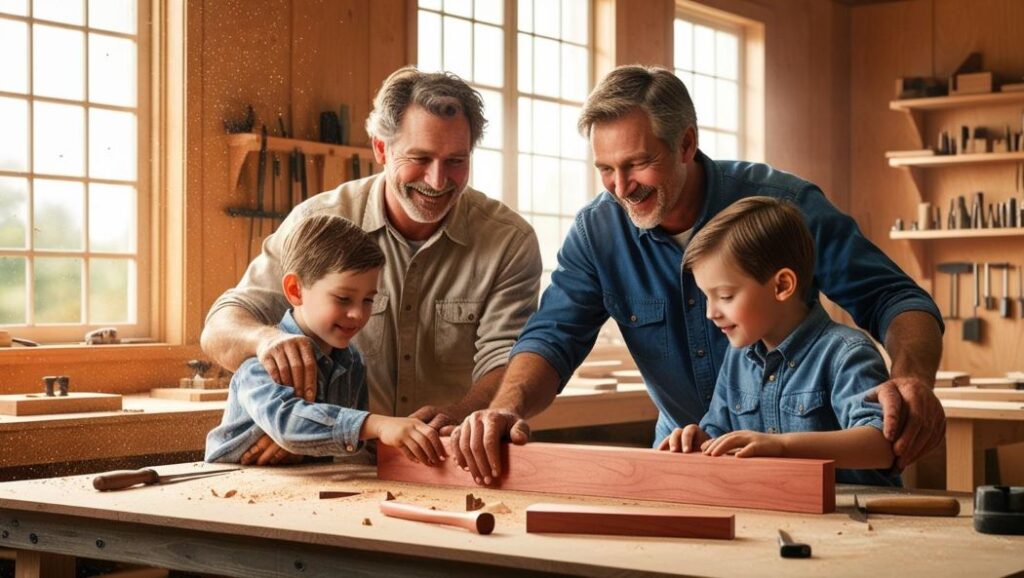
4. The Geography of Your Roots and Personal Identity
Ever wonder why certain places feel like home, even if you’ve never lived there? Your ancestors might have the answer. Hugh Mackay’s “The Art of Belonging” explores how ancestral homelands influence our sense of self. This connection manifests strongly in diaspora communities, where maintaining ties to ancestral lands shapes cultural identity and personal narrative.
Cultural geographer Yi-Fu Tuan explains how our sense of place shapes our identity “People think that geography is about capitals, landforms, and so on,” says Tuan. “But it is also about place — its emotional tone, social meaning, and generative potential.” So, that pull you feel toward the ocean or mountains or the yearning to visit ancestral lands might come from the experiences and loyalties of generations before you.
Your design preferences might reflect this too. Love Scandinavian minimalism? Check your family tree – your ancestors might have something to do with it.
The rising popularity of DNA tourism also reflects our deep need to connect with ancestral geography. People increasingly travel to their ancestors’ homelands, seeking tangible connections to their family history and deeper understanding of their identity.

5. The Transformative Power of Family Narratives
Remember the last time you heard a family story that gave you goosebumps? Family narratives do more than entertain – they’re the bedrock of identity. They build our foundation of values and shape our worldview.
My mother’s stories about surviving tough times in the Midwest in the 30’s taught me about never giving in to the traumatic events of our lives. My father’s tale of overcoming the loss of his mother to illness and his father to an unjust prison conviction while still holding fast to his faith – shaped my approach to the challenges I’ve faced in my own life.
Research backs this up. Bruce Feiler’s groundbreaking studies show that children who know their family stories show better emotional well-being. They develop stronger coping skills and higher self-esteem. Psychologist Dan P. McAdams found that families sharing narratives of overcoming challenges foster adaptability and stronger bonds. Conversely, narratives focused on past failures can create limiting beliefs and expectations.
Want to tap into this power? Documenting family stories through journaling and oral histories preserves these powerful narratives for future generations. Start a family storytelling tradition. Set aside one evening each month for sharing stories. Record them in a journal or create a digital archive. Each retelling strengthens family bonds and contributes to collective identity.
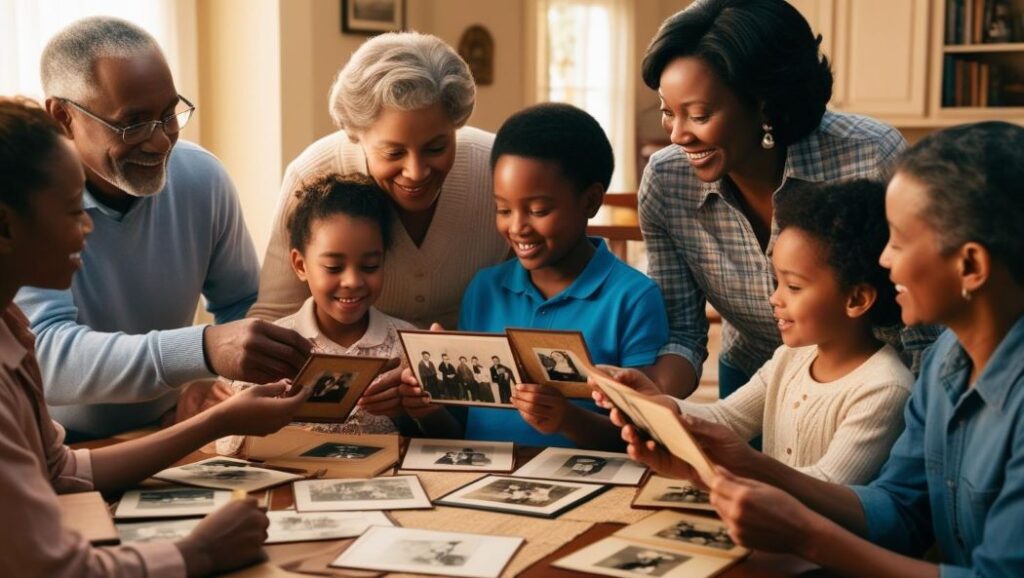
Embracing Your Heritage
Understanding your family tree transcends mere historical curiosity – it’s an act of profound self-discovery. By exploring our ancestral influences, we gain insight into patterns that shape our lives and choices.
As you delve into your family history, approach it with curiosity and compassion. Each discovery offers an opportunity to better understand yourself and your place in your family’s continuing story.
Start exploring today:
- Research your family history using one of many tools available. Check out our articles Tracing Your Family Tree for Free: A Comprehensive Guide and Genealogy for Beginners: Best Free Online Courses for tips on getting started.
- Create a family motto
- Connect with relatives to gather stories
- Consider professional support for processing family trauma
Remember, understanding your roots doesn’t limit your growth. It gives you rich soil to grow your own unique path. While family history shapes us, it doesn’t define us. Your story is yours to write.
What story from your family tree has shaped you most profoundly? Share your thoughts in the comments below!
Ready to dig deeper? Here are some tools to get you started.
Take the Quiz
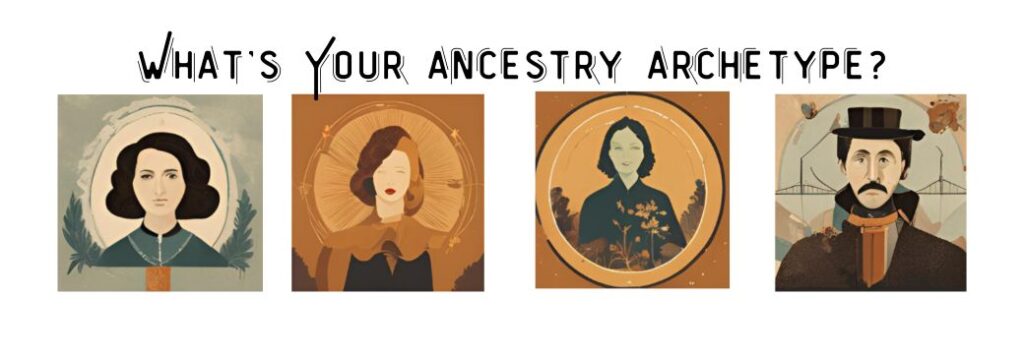
Was this article helpful? Next try taking our fun quiz “What Does Your Family Tree Say About You?” At the end you’ll receive your “Ancestry Archetype” and action steps to advance you along your ancestry journey.
Download a FREE Mini-Guide – “5 Ways to Use Family History to Heal & Grow”
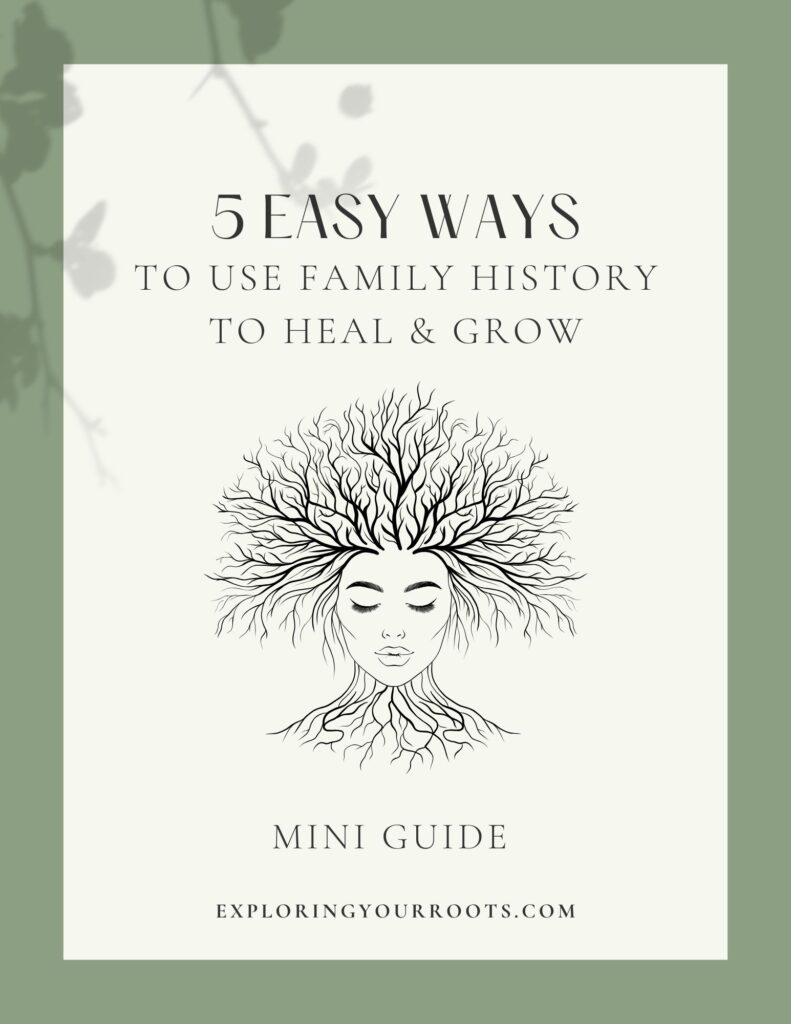
Discover the strength and wisdom hidden in your family history!
Your ancestors’ stories are more than memories; they are powerful lessons that can guide your personal growth, healing, and self-discovery. Our free worksheet will help you take the first steps on your journey of uncovering and connecting with your roots.
Dive into these quick prompts and exercises to begin exploring how your heritage shapes your identity and resilience. Watch for more resources and tools to enrich your self-discovery journey through our website, newsletter, and social media channels!
Go Even Deeper with Our Guided Journal
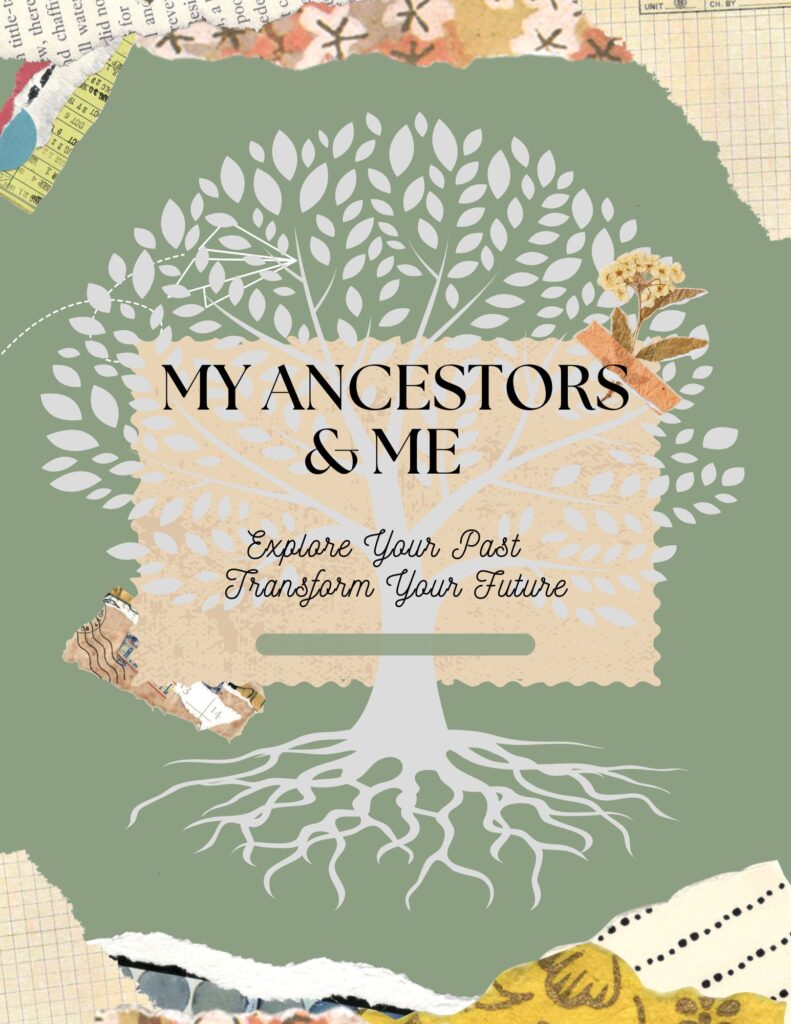
Purchase and download our fillable journal, “My Ancestors & Me,” a guided journey of self-discovery that features advanced reflection questions that will spark your curiosity and get you on the path to an exciting family history adventure. Buy “My Ancestors & Me” now and receive a bonus template for conducting in-depth family interviews.
More articles to explore:
The Life-Changing Benefits of Family History Research
Self-Discovery Quotes: How Family History and Ancestry Shape Identity
Sources:
- Feiler, Bruce. “The Secrets of Happy Families.”
- Yehuda, Rachel. Research on epigenetic inheritance of trauma.
- Tuan, Yi-Fu. “Space and Place: The Perspective of Experience.”
- Belonging to this place: A conversation with Yi-Fu Tuan.
- Frankl, Viktor. “Man’s Search for Meaning.”
- Jung, C. G. (1968). “The Archetypes and the Collective Unconscious.”
- Wolynn, M. (2016). “It Didn’t Start with You: How Inherited Family Trauma Shapes Who We Are and How to End the Cycle.”
- MacIntyre, A. (1988). “Whose Justice? Which Rationality?”
- Mackay, H. (2014). “The Art of Belonging: It’s Not Where You Live, But How You Live.”
- McAdams, D. P. (1997). “The Stories We Live By: Personal Myths and the Making of the Self.”
